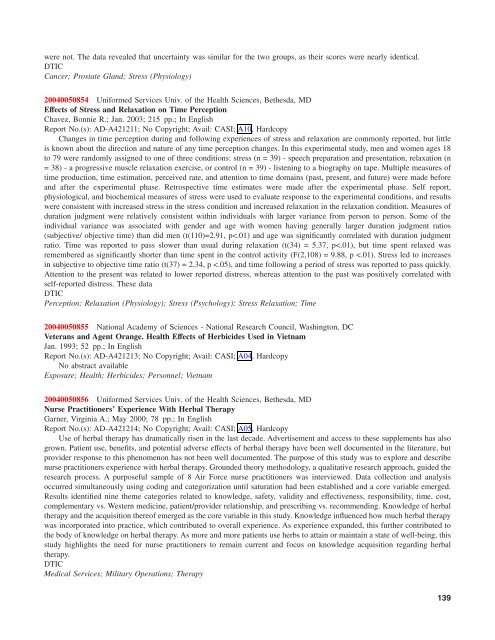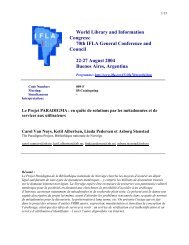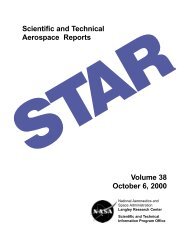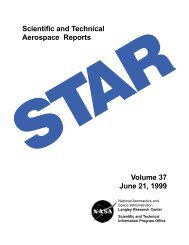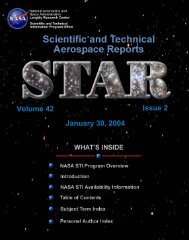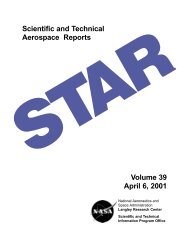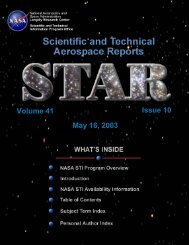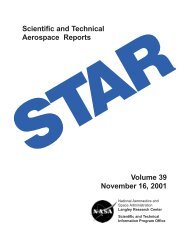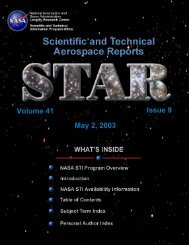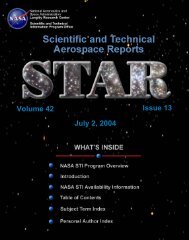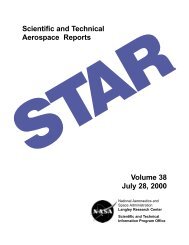- Page 2 and 3:
NASA STI Program ... in Profile Sin
- Page 4 and 5:
NASA STI Availability Information N
- Page 6 and 7:
Geosciences 42 Geosciences (General
- Page 8 and 9:
SCIENTIFIC AND TECHNICAL AEROSPACE
- Page 10 and 11:
University, DC. Seven Graduate Rese
- Page 12 and 13:
display that presented NEXRAD mosai
- Page 14 and 15:
supersonic flows was used. Several
- Page 16 and 17:
on the control of nonlinear behavio
- Page 18 and 19:
velocity from space. The measuremen
- Page 20 and 21:
20040050771 Massachusetts Inst. of
- Page 22 and 23:
chemical reactions and four gas-sur
- Page 24 and 25:
19 SPACECRAFT INSTRUMENTATION AND A
- Page 26 and 27:
20040047006 Helsinki Univ. of Techn
- Page 28 and 29:
20040050610 NASA Marshall Space Fli
- Page 30 and 31:
20040046926 NASA Langley Research C
- Page 32 and 33:
approximately % into the completion
- Page 34 and 35:
20040047251 NASA Marshall Space Fli
- Page 36 and 37:
poly(phenylene ethynylene) backbone
- Page 38 and 39:
y extrapolation of data for tempera
- Page 40 and 41:
20040050275 Lehigh Univ., Bethlehem
- Page 42 and 43:
20040050700 Oak Ridge Inst. for Sci
- Page 44 and 45:
oxidation state of uranium via char
- Page 46 and 47:
A designer Quantitative Structure-P
- Page 48 and 49:
32 COMMUNICATIONS AND RADAR Include
- Page 50 and 51:
The authors conducted research to s
- Page 52 and 53:
McKinsey report, August 2001, the m
- Page 54 and 55:
group. A coding scheme for command
- Page 56 and 57:
Electromagnetic radiation with high
- Page 58 and 59:
particularly devoted to basic chara
- Page 60 and 61:
An implementation of both finite ra
- Page 62 and 63:
enefits by comparison with the case
- Page 64 and 65:
20040050723 Illinois Inst. of Tech.
- Page 66 and 67:
analysis, mainly image content anal
- Page 68 and 69:
36 LASERS AND MASERS Includes lasin
- Page 70 and 71:
oundaries. For the composite plates
- Page 72 and 73:
20040050712 Congressional Budget Of
- Page 74 and 75:
performance which provides ideal pa
- Page 76 and 77:
energy scheme. This work reviews an
- Page 78 and 79:
five Los Angeles County communities
- Page 80 and 81:
conditions on (a) NOx concentration
- Page 82 and 83:
Main parameters used in the new sim
- Page 84 and 85:
years. It is currently in its fifth
- Page 86 and 87:
kinematical properties of halo CMEs
- Page 88 and 89:
Transient Detector (OTD), followed
- Page 90 and 91:
51 LIFE SCIENCES (GENERAL) Includes
- Page 92 and 93:
Serinehhreonine protein phosphatase
- Page 94 and 95:
20040050642 Cleveland Clinic Founda
- Page 96 and 97: few providers accept Medicare or TR
- Page 98 and 99: 20040050655 University of South Flo
- Page 100 and 101: 20040050663 Johns Hopkins Univ., Ba
- Page 102 and 103: iotechniques to identify the gene l
- Page 104 and 105: Neurfibromatosis type 2 (NF2) is a
- Page 106 and 107: 20040050689 Cedars-Sinai Medical Ce
- Page 108 and 109: although Provider Perspectives had
- Page 110 and 111: process were made based on the deta
- Page 112 and 113: 20040050714 Johns Hopkins Univ., Ba
- Page 114 and 115: prospective randomized trial carrie
- Page 116 and 117: 20040050727 Trudeau Inst., Inc., Sa
- Page 118 and 119: obstetric records, 111 soldiers wer
- Page 120 and 121: esearch into the next decade, and r
- Page 122 and 123: 20040050760 Parkinson’s Inst., Su
- Page 124 and 125: 20040050773 Uniformed Services Univ
- Page 126 and 127: Beta-catanin, is an important compo
- Page 128 and 129: study revealed that an overwhelming
- Page 130 and 131: 20040050798 Illinois Univ., Chicago
- Page 132 and 133: NIH3T3 fibroblasts, neurobibromin-
- Page 134 and 135: factor assessment, cholesterol and
- Page 136 and 137: shifts in HRV have been observed be
- Page 138 and 139: 20040050827 Academy of Health Scien
- Page 140 and 141: most of the information about their
- Page 142 and 143: 20040050838 Uniformed Services Univ
- Page 144 and 145: esolution and tissue contrast. Digi
- Page 148 and 149: effectiveness of the advanced bladd
- Page 150 and 151: of location cue. The later requires
- Page 152 and 153: 20040046872 Sichuan Univ., Chengdu,
- Page 154 and 155: Numerous studies have shown a relat
- Page 156 and 157: of evolution type equations. We app
- Page 158 and 159: classical divide and conquer algori
- Page 160 and 161: alternative is a commercial databas
- Page 162 and 163: using state-of-the-art computing an
- Page 164 and 165: ecursive least squares estimation.
- Page 166 and 167: designed to be massively parallel a
- Page 168 and 169: when the CAD entity can be mapped t
- Page 170 and 171: confidence interval (error bar) aro
- Page 172 and 173: This paper presents a method for fi
- Page 174 and 175: Bayesian belief networks are graphi
- Page 176 and 177: the corresponding penalty parameter
- Page 178 and 179: Precision measurements in the neutr
- Page 180 and 181: 20040047242 Lawrence Livermore Nati
- Page 182 and 183: The development of a new class of l
- Page 184 and 185: Measurements of electromagnetic rad
- Page 186 and 187: I report two significant figures. T
- Page 188 and 189: of zero crossing momentum, which be
- Page 190 and 191: 72 ATOMIC AND MOLECULAR PHYSICS Inc
- Page 192 and 193: component of gamma spectra resultin
- Page 194 and 195: We have developed high-resolution N
- Page 196 and 197:
allows for correction of the optica
- Page 198 and 199:
are not accurate. The goal is to pr
- Page 200 and 201:
much less vaporization of the Au co
- Page 202 and 203:
start with discussion of the simula
- Page 204 and 205:
76 SOLID-STATE PHYSICS Includes con
- Page 206 and 207:
From 1989 to 2000, the U,S. Navy sp
- Page 208 and 209:
20040046154 Nebraska Univ., Omaha,
- Page 210 and 211:
program pavement performance databa
- Page 212 and 213:
converters, wavelength calibration
- Page 214 and 215:
egion of the supernova remnant in a
- Page 216 and 217:
velocity-position gradients orthogo
- Page 218 and 219:
20040046922 Harvard-Smithsonian Cen
- Page 220 and 221:
afterglow counterparts to gamma-ray
- Page 222 and 223:
same title as before. It is dedicat
- Page 224 and 225:
iefly discussed with respect to imp
- Page 226 and 227:
KPNO Instruments Available for 2004
- Page 228 and 229:
Clark is used to further limit the
- Page 230 and 231:
Contents include list of publicatio
- Page 232 and 233:
surprising results. This model for
- Page 234 and 235:
99 GENERAL Includes aeronautical, a
- Page 236 and 237:
ABLATIVE MATERIALS Ablative Thermal
- Page 238 and 239:
ALKALIES Enzymatic Properties of an
- Page 240 and 241:
Monthly Report of the Meteorologica
- Page 242 and 243:
BYPASS RATIO High-Fidelity Three-Di
- Page 244 and 245:
CHEMICAL REACTIONS A Study of the R
- Page 246 and 247:
Computational Data Compression for
- Page 248 and 249:
CROSSED FIELDS Open and Closed Magn
- Page 250 and 251:
Gaseous Laser Targets and Optical D
- Page 252 and 253:
ELECTROMECHANICAL DEVICES Design Me
- Page 254 and 255:
FABRICS Repair of Damaged Concrete
- Page 256 and 257:
GENES Cloning and Characterization
- Page 258 and 259:
HEMODYNAMIC RESPONSES A Simulation
- Page 260 and 261:
Understanding the Solar Sources of
- Page 262 and 263:
LASER-INDUCED BREAKDOWN SPEC- TROSC
- Page 264 and 265:
Molecular Mechanisms of Soft Tissue
- Page 266 and 267:
MECHANICAL DRIVES WO21.3 Direct Dri
- Page 268 and 269:
MICROWAVES Effect of Microwave Irra
- Page 270 and 271:
NEUTRON EMISSION Electron Density a
- Page 272 and 273:
PARTITIONS (MATHEMATICS) Bipartite
- Page 274 and 275:
New ISTP Solar Max: A Multi-Spacecr
- Page 276 and 277:
Computational Modeling of Human Mul
- Page 278 and 279:
ROVING VEHICLES Getting the Most fr
- Page 280 and 281:
Interpretive Tools for Analysis of
- Page 282 and 283:
STRUCTURAL ENGINEERING Proceedings
- Page 284 and 285:
THERMAL CONDUCTIVITY Processing and
- Page 286 and 287:
ULTRAVIOLET SPECTROMETERS Calibrati
- Page 288 and 289:
X RAYS A Study of the Non-Thermal X
- Page 290 and 291:
Avery, Shelly Aerospace Workforce D
- Page 292 and 293:
Buehrle, Ralph D. Design, Fabricati
- Page 294 and 295:
Corletti, M. M. Study of Cost Effec
- Page 296 and 297:
Egudo, M. A Review of Narrative Met
- Page 298 and 299:
Ge, Xin-Fa Blood Oxygen and Lactate
- Page 300 and 301:
He, Ping A Simulation Study on Card
- Page 302 and 303:
Kamath, C. Approximate Splitting fo
- Page 304 and 305:
Layton, D. W. Review of the Data Su
- Page 306 and 307:
Massie, Jodi A. Changes in Weight E
- Page 308 and 309:
Nagib, Hassan M. Impact of External
- Page 310 and 311:
Plaskon, Stephen R. Ice Particle Im
- Page 312 and 313:
Saric, William S. Pulsed-Sound Meas
- Page 314 and 315:
Smith,J.N. WO21.3 Direct Drive Reen
- Page 316 and 317:
Trimble, D. Investigation of Vacuum
- Page 318 and 319:
Whitlock, Warren L. Phase II-SOF Kn


